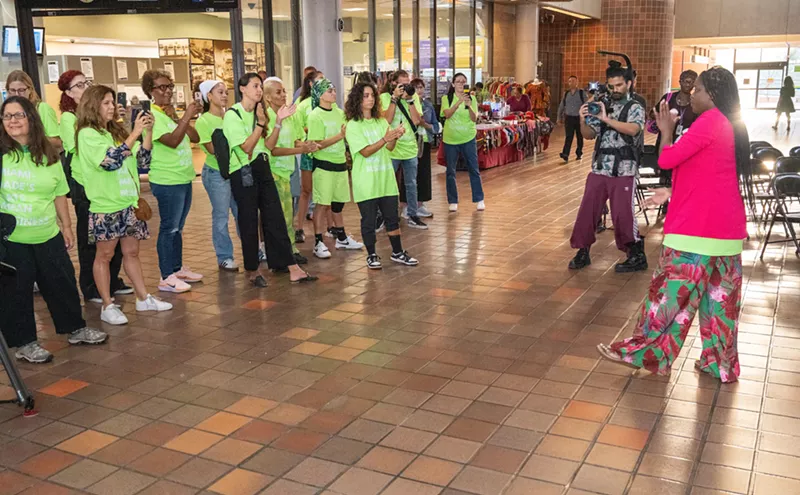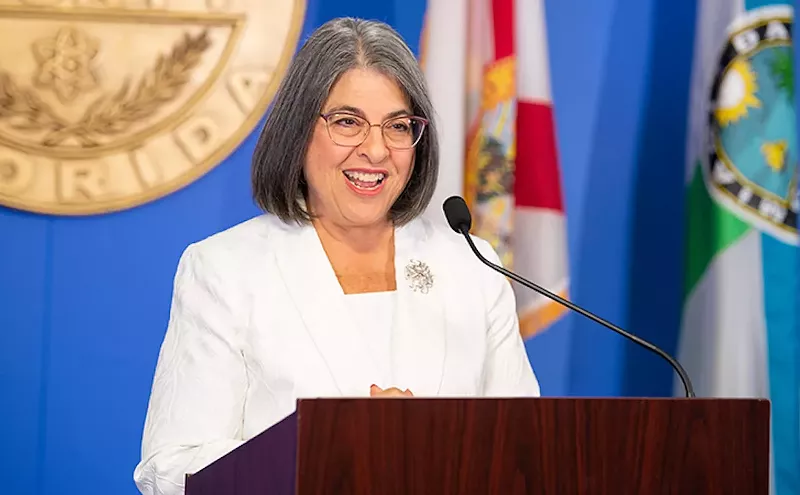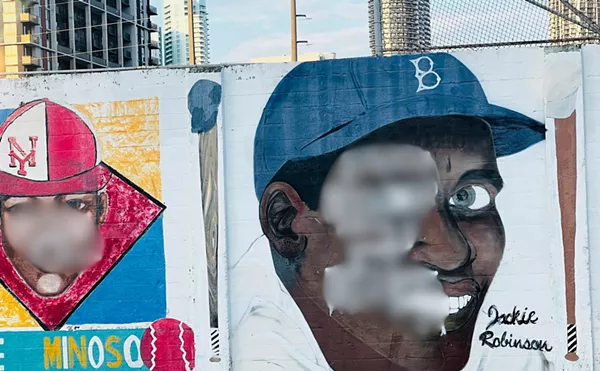Many unforgettable movies played at the Grove Cinema, and Richard Fendelman, who ran the cinema with his younger brother, James, as the Fabulous Flying Fendelman Brothers, says he hears such stories all the time. “Everybody had their favorite movie,” says the 68-year-old and pauses. “Um, of course, I don't want this on my tombstone. I've got other things I've done since then, but I think everybody remembers the lines going around the block to see Rocky Horror Picture Show.”
Speaking via phone from his Asheville, North Carolina, home, his 65-year-old brother groans, “Cleaning up after Rocky Horror Picture Show, those are not fond memories."
The 1975 glam rock musical had an almost permanent presence on the theater’s marquee. Richard says they started with regular screenings in 1977 on Fridays at 10 p.m. They then added a second regular screening at midnight and, later, Saturdays at midnight. But it still fell short of the demand, so they added screenings on Wednesday nights at 10 p.m. The Rocky Horror Picture Show ended up playing at the theater for 15 years, thus the Grove Cinema became known for having the longest run of Rocky Horror in the entire U.S.
But the theater had a lot more about it that made it a distinctive part of Miami's history. The Grove Cinema opened in 1973. The Fendelmans hosted screenings with rented 16mm projectors at a playhouse called the Upstage Theater off Virginia, near Grand Avenue, where CocoWalk and a Cinépolis now stand. In October of 1976, they moved to a space that used to be a Winn-Dixie supermarket on the corner of Grand and McDonald, re-purposing the structure into a proper movie house. Richard says it was his younger brother who thought it would be easy to run a movie house because he worked at an art theater in Austin, at the University of Texas. "It turned out to be really, really hard, and we didn't make a lot of money," Richard says.
It was the place to catch foreign movies and art house fare that wouldn't play at commercial cinemas like the Wometco-owned theaters that played commercial, big-studio pictures. A cinema like this pulled in the local community and the film and art community from all over the world.
“There was always something unexpected happening,” says James. “There were a lot of people who would drop in who had something to do with
It was the kind of place, James says, that people around the world heard about and when they visited Miami new they had to check out. The brothers shared stories featuring Bob Marley and David Crosby. James says he particularly enjoyed hosting critics preview screenings for the likes of Bill Cosford and others. "[Film critics] were a kind of great audience to see a film for the first time with," says James. "They really cared about the movies."
There were also some small details that made the Grove Cinema different from other movie houses. The theater had a snack selection like none other. It was the first to have Suji Mama popcorn spice, a concoction of 20 spices, remembers James. "It was great because it wasn't butter,” he says. “It had that zing to it. People started stopping in just to get popcorn. They'd drop by and get a couple of bags and go. It was great. It was my meal many times," he adds with a laugh.
Other art houses around the country asked about it and soon the spice’s inventor, Susan Bell, began supplying other theaters with her spices. Many also remember the Grove Cinema had a baker and an organic concession stand before "organic" was a trendy marketing word, including an iced tea that was really popular among patrons. "We were hippies," says Richard. They also served wine and had beer on tap. Back then, Richard says, he only knew of one movie house in Texas that offered draft beer.
Of course, nothing outshined the movie experience at the Grove Cinema. The Fendelmans worked hard for exclusive screenings, but they also believed in giving great movies second chances. One film Richard says he was proud of showing was the 1979 movie Being There, starring Peter Sellers. Now a classic in the world of cinema, its initial run in major theaters was a terrible disappointment at the box office. In Miami, Richard says, "It played like one theater and came and went ... I went, wow, everybody missed this movie. We gotta bring this movie back."
Within the next few weeks, Richard convinced the distributor, United Artists, to send a print of the film to the Grove Cinema. "And it was packed," says Richard. "People were like, ‘Wow, where did this movie come from?’ They didn't promote it right. Nobody got to see it. So that was a great thing, turning people on to those movies."
When asked what may have ultimately killed the Coconut Grove Cinema, Richard mentions the fateful 1986 release of James Ivory’s A Room With a View. Miramax, the distributor that was once owned by Harvey Weinstein of the Weinstein Company, would usually give art films like this English drama to indie theaters like the one owned by the Fendelmans.
For some reason, he says, Miramax played it at the Dadeland Twin Wometco, and it was a hit. "That's when they realized they could play art films in regular theaters and chains,” recalls Richard, “so in the next few years probably hundreds of theaters, art theaters like mine, closed because they couldn't get the films anymore. You had to pay so much money. You had to sell out every night just to break even."
In order to keep the venue open, the Fendelmans tried turning the theater a nightclub. Richard would DJ, and they booked live bands. “We hung in there,” he says. However, “The timing wasn't right, music was in transition." When they could no longer pay the bills, the Grove Cinema closed.
Both brothers admit to feeling nostalgic for those Grove Cinema years. “I had a dream about it the other night,” Richard offers. “I got disoriented. I was wondering, do we have to be in the theater tonight? If I go down there will I still see it? So it still haunts me in a way.”
Today, Miami-Dade County has one of the highest concentrations of independent cinemas in the United States. Asked what he thinks accounts for the boom in the Miami art house scene, Richard mentions a combination of factors: "I think people are getting more sophisticated about movies. There's this sort of resurgence of going out to see a movie and being around other people who love movies. Look at [Miami Dade College’s Miami International] Film Festival, how popular it is. I think the population has grown tremendously with people from all over the world. We have more taste for movies. I think one of the big things, and I could be wrong, is the support of the Knight Foundation. It has given grants to some of these theaters and possibly other government grants. We never got any grants. There was no place for us to get any support."
"We either made it or we didn't make it," he laughs.
But don’t worry about the Fabulous Flying Fendelman Brothers, they don’t feel they’re missing out on anything. James is happy he doesn’t get phone calls at two in the morning anymore from the security system, and Richard is done dealing the tight budget of running a theater. He now runs his own commercial video production company specializing in on-line video coverage and streaming (artsandculturetv.com ) and works with 360-degree virtual reality footage for Oculus Rift and Samsung Gear VR as well as computer and cell phone video (Miami360vr.com). He still lives in Coconut Grove.
Meanwhile, James is retired and lives part-time in North Carolina where he still soaks in the film culture and enjoys recreational sports. "I still watch a lot of films, and I play tennis and listen to music and do all that kind of stuff," he says.
Follow Hans Morgenstern on Twitter.












